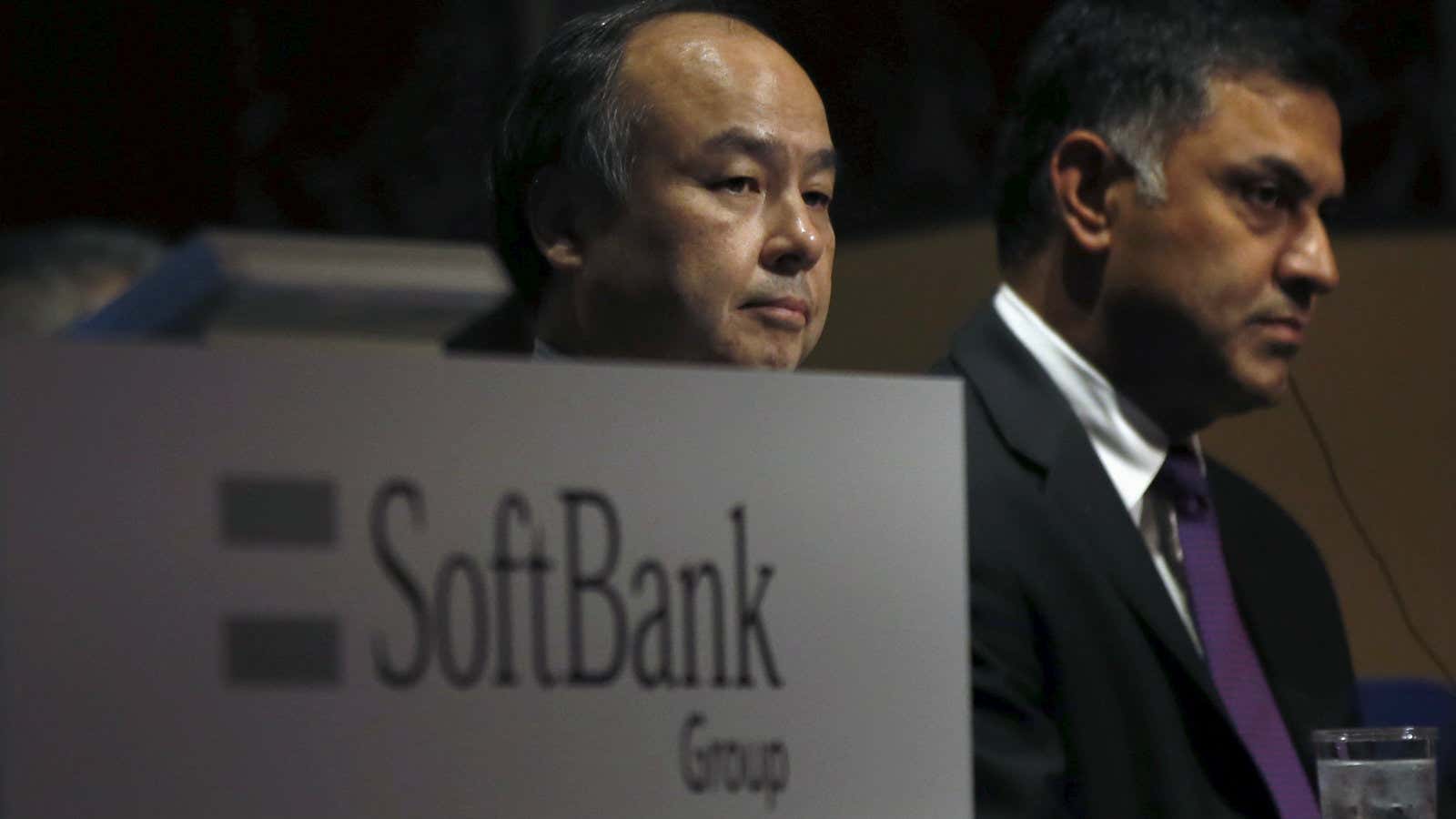It’s almost like a Bollywood script: An engineering graduate from India borrows $3,000 from his father to study abroad. He comes to the US, where he flips burgers and works as a security guard to support himself. His hard work pays off; within 20 years, he is counted among the top executives at one of the world’s hottest companies. He gives up the cushy job, though, and makes a huge gamble with his career. And then contention strikes.
That’s the story of Nikesh Arora, one of the highest-paid executives in the world. Today (June 21) he shocked the telecom and technology sector with an announcement (pdf) that he was resigning from SoftBank Group, over differences with SoftBank founder and CEO Masayoshi Son about the latter’s succession plans.
“I was thinking of handing over my job as CEO when I turn 60, but thought maybe I’m still a bit too young, and still have energy to continue,” Son, who is 58, told the Wall Street Journal.
But there is more to this story.
The announcement of Arora’s departure from SoftBank comes just one day after a special board committee convened by SoftBank cleared him of allegations raised by an anonymous bunch of investors.
The company said on June 20 that the committee, which was set up to investigate the concerns raised by investors about Arora’s work ethics and performance, had determined ”that the claims concerning the conduct of Mr. Arora during his tenure at SBG (SoftBank Group) are without merit.”
Arora, an IIT alum who joined SoftBank in 2014 after a 10-year stint at internet giant Google, will now serve as an advisor at SoftBank for a year. If he has any other plans as of yet for his future, he has not made them public.
$135 million in pay
After arriving at SoftBank, Arora had everything going for him. Six months into his job at SoftBank, Arora was the world’s third-highest-paid executive. He earned about 16.6 billion yen ($135 million) between joining the company in September 2014 and by the end of March 2015.
Son, one of Japan’s richest men, had publicly described Arora as his heir apparent. In August 2015, Arora went all-in, announcing a personal investment of $483 million in SoftBank. He reportedly borrowed money to make the investment.
But his run at the company hit a speed bump in January, when a group of SoftBank shareholders wrote an anonymous letter to the company expressing their displeasure with Arora’s performance and ethics. The 11-page letter, dated Jan. 20, was sent by US-based law firm Boies Schiller & Flexner, which did not disclose whom it was representing. The letter was reported in the media in April. It was not, SoftBank said, the first time it had been contacted by the law firm.
The January letter raised questions about Arora’s ties to the private equity world, and whether they conflicted with his role in making investment decisions at SoftBank. It described his investment strategy as “nothing more than throwing a dart at a dartboard,” and expressed anxiety over his decisions to provide backing to companies including Housing.com, an Indian real estate portal that had run into trouble soon after SoftBank’s investment.
“How many more millions of dollars of shareholder value must be wasted before the board realizes something must be done?” the letter asked.
A mentor to many
This wasn’t the only group raising questions about the companies Arora had added to SoftBank’s portfolio. For instance, grocery delivery startup Grofers, where SoftBank invested $120 million in November 2015, has failed to scale its business; in January, it reportedly shut operations in nine cities. And hotel rooms aggregator OYO Rooms, for whom SoftBank led a $100-million financing round, has been dogged with criticism about its business model.
But Arora must get the credit for establishing SoftBank’s foothold in the world’s fastest-growing startup ecosystem. He played a vital role in channeling SoftBank’s money into Indian startups. (Most of the group’s $2 billion in Indian investments were made after he joined.) And in the process, he cultivated a massive following of friends and fans.
“Nikesh is such a great friend, guide and mentor to me personally,” said Bhavish Aggarwal, co-founder and CEO of ride-hailing startup Ola. “I am sure he will continue to be a source of support and inspiration to the Indian startup ecosystem.” Snapdeal’s co-founder and CEO Kunal Bahl also called Arora his mentor.
At the Startup India event in Delhi hosted by the Indian government in January, Arora and Son were the most prominent guests, getting top billing even above American venture capital firms like Tiger Global and Sequoia, which have significant exposure in the country.
It will be interesting to see who Son hires or promotes to fill Arora’s shoes—and whether his successor will be as tightly plugged into India.
